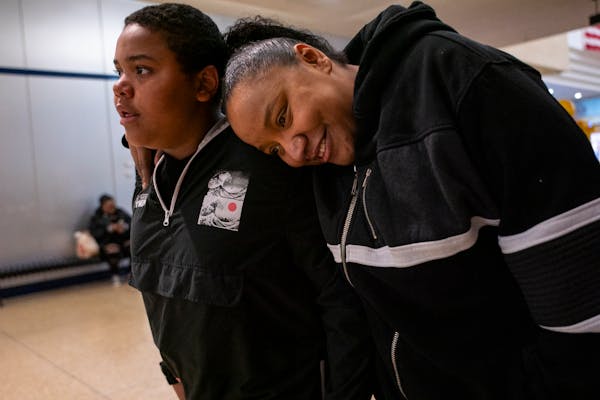Parents of budding musicians might not believe this, but Will Eisenberg's mother and father never had to remind him to practice. They did have to remind him to stop playing and do his homework.
So it's not terribly surprising that Eisenberg, 23, is completing his master's degree in music at Yale University — until you know the back story.
Eisenberg, of Minnetonka, was not predicted to be the accomplished musician that he is. At around age 1, he was diagnosed with mild hemiparesis cerebral palsy, a weakness that affects one side of the body. In Eisenberg's case, the paralysis is on his right side, making an orchestral career unlikely.
But his mother, Jill, a flute player throughout college, knew something essential. The valves of the French horn, a hauntingly beautiful brass instrument, are played on the left side, requiring left-side proficiency.
To make sure that no band director could tell her son, "Sorry, we don't have a French horn," Jill went to every secondhand store she could find, scoring a "large, old, clunky French horn" and bringing it home.
Her pragmatic fifth-grade son, who had never shown any interest in piano and who cried when she sang lullabies to him (off-key), studied it. Then he started to play, Jill said.
"And, oh, my gosh."
Eisenberg mastered the entire first-year lesson book in months. He played throughout elementary and middle schools, taking private lessons with French horn teacher Mary Brindle. In seventh grade, he surprised his parents during a school concert, stepping forward as a soloist.
"He never mentioned it to us," Jill said.
After a few years, Brindle tried to convince her young charge to move on to a more advanced teacher. But he loved Brindle, Jill says.
"She called him her little monster. He'd play his heart out for her."
Before graduating from Hopkins High School in 2008, Eisenberg studied with Neal Bolter of the Minnesota Opera and performed as a soloist with the Greater Twin Cities Youth Symphonies.
In 2012 he graduated from the Oberlin Conservatory of Music in Oberlin, Ohio, where he was a section leader with the Oberlin Conservatory Orchestra and Chamber Orchestra. Last year, he performed at the Kennedy Center in Washington, D.C.
"Everyone out there has something they struggle with," Eisenberg said in a phone interview earlier this week. "For me, it was the physical side."
As school begins and excitement builds among kids considering playing an instrument, "I can be out there advocating for people," Eisenberg said.
That Eisenberg wasn't diagnosed with cerebral palsy at birth was a blessing, said Jill, a special-education teacher. "We got to know the child first."
Looking back, there were many signs. His feet pointed slightly sideways and didn't self-correct. He only nursed on one side. When he pulled to standing, he did so only on one foot. "He looked like a stork," Jill said.
After the diagnosis, Eisenberg began physical and occupational therapy, followed by speech therapy. He set goals, such as to ride a bicycle, to ski, to play computer games — and reached each one.
He wasn't immediately bullish on music, although it's clearly in his genes. His paternal grandfather was a concertmaster with the Syracuse Symphony. Jill's grandmother was a concert pianist in Chicago. His father, Jon, an attorney, played clarinet in high school. Will's 28-year-old brother, Sam, plays trumpet.
When Eisenberg was about 10, he became a patient of Marshall Taniguchi, M.D., a pediatric rehabilitation doctor at Gillette Children's Specialty Healthcare.
Taniguchi quickly became the young man's greatest cheerleader, asking about his music and other interests before asking him about his physical challenges.
"William always struck me as extraordinarily serious and focused," Taniguchi said. "It's been great to watch him develop."
Even now, Taniguchi tells Gillette families about his gifted French horn player patient to inspire them.
Last year's performance at the Kennedy Center was a highlight for Eisenberg. He was honored, along with a handful of other musicians, by VSA, an international organization founded by Jean Kennedy Smith to provide arts opportunities for people with disabilities.
"Music, or any art really, is just sort of a really special thing to do," said Eisenberg, who does make time to read fantasy sci-fi and follow the Timberwolves. "It's a way to express yourself," and see the world.
He has traveled to China and Singapore and spent a summer outside Florence, Italy, playing chamber music.
After a summer with the Atlantic Music Festival, Eisenberg is looking toward graduation in May. He'd like to be an orchestral horn player or maybe a music teacher, knowing what patient, nurturing teachers can mean to a child.
His mom knows that the road to a professional career can be grueling.
But she doesn't worry, much.
"You put a horn in his hands," she said, "and he owns the world."
Gail Rosenblum • 612-673-7350

Who inspires you?

Northfield's caring College Collaborative helps young parents succeed



